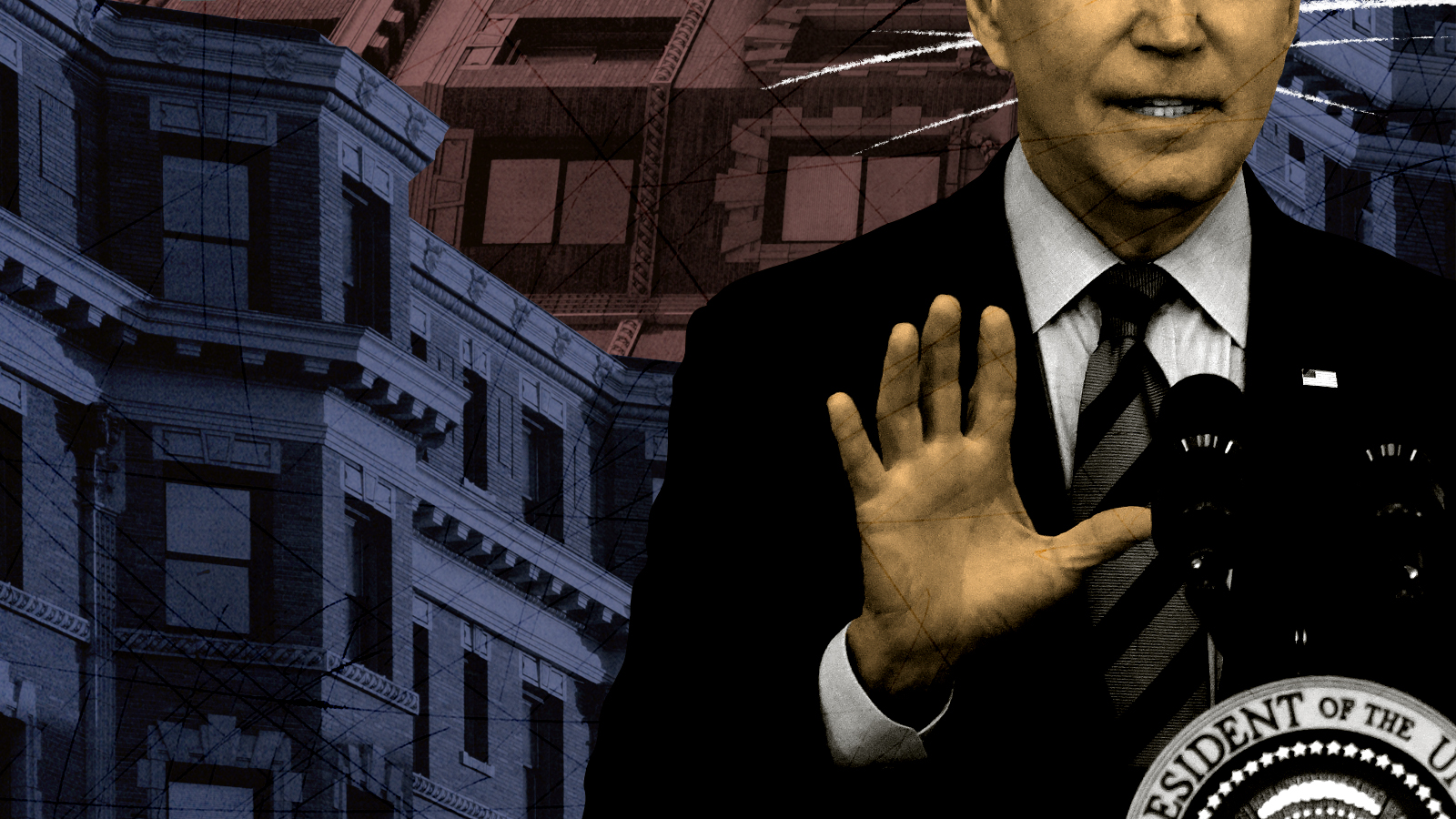Biden's eviction moratorium isn't the abuse of power his critics claim
The rule of law has much bigger problems


A free daily email with the biggest news stories of the day – and the best features from TheWeek.com
You are now subscribed
Your newsletter sign-up was successful
Is President Biden a scofflaw trampling over the Constitution because he extended the pandemic eviction moratorium? So argues the Wall Street Journal editorial board, the Washington Examiner, and my colleague Bonnie Kristian, among many others. Fox News pundit Glenn Greenwald heatedly compared the move to President Bush's warrantless wiretapping scheme in 2005.
These objections are at best unconvincing, and at worst ridiculous hysteria.
First, the primary objection raised in these arguments is that Supreme Court Justice Brett Kavanaugh wrote in a concurring opinion that he thought extending the moratorium would be unlawful without additional legislation, but Biden is going ahead even though he seems to be skeptical about his own administration's legal rationale. Yet Biden's move is still not illegal.
The Week
Escape your echo chamber. Get the facts behind the news, plus analysis from multiple perspectives.

Sign up for The Week's Free Newsletters
From our morning news briefing to a weekly Good News Newsletter, get the best of The Week delivered directly to your inbox.
From our morning news briefing to a weekly Good News Newsletter, get the best of The Week delivered directly to your inbox.
Here's why. The court recently upheld the moratorium with a 5-4 vote in which justices Roberts and Kavanaugh sided with the liberals. As Matt Bruenig explains at the People's Policy Project, Kavanaugh's concurrence had nothing to do with the direct legal question at hand, and is therefore "dicta," or not legally binding. Until there is another case in which we get a majority ruling that says explicitly the eviction moratorium is no good, Biden is legally in the clear to extend the moratorium if he wants.
Furthermore, the argument against the eviction moratorium is a lot weaker today than it was back on June 29 when that Supreme Court ruling was issued. Back then, the national average of positive coronavirus cases was about 12,000 per day — the lowest numbers seen since March 2020. But at time of writing, that same average is about 96,000 per day, and soaring upwards. Poorly-vaccinated states like Florida, Mississippi, Arkansas, and Louisiana are seeing some of the worst case numbers since the start of the pandemic — and unlike in the U.K., surging hospitalization and deaths as well.
The law governing pandemic control measures says:
The Surgeon General, with the approval of the Secretary, is authorized to make and enforce such regulations as in his judgment are necessary to prevent the introduction, transmission, or spread of communicable diseases from foreign countries into the States or possessions, or from one State or possession into any other State or possession.
It stands to reason that the legal soundness of pandemic controls would at least be related to the severity of the pandemic in question. So long as the U.S. is in the midst of a galloping nationwide surge of coronavirus cases, then surely Biden would have a much stronger argument to make to Kavanaugh in a future case.
A free daily email with the biggest news stories of the day – and the best features from TheWeek.com
As a more general matter, for most of its history the Supreme Court has functioned as another unelected legislature that writes its own laws based on little or no legal principle. The very idea of judicial review is nowhere to be found in the Constitution. It may be American tradition for Congress and the president to allow themselves to be pushed around by nine power-mad judicial clerics, but that does not constitute the rule of law.
But all this is frankly beside the point. This country has not had the rule of law for many years, if it ever did. For instance, the entire top echelon of the George W. Bush administration conspired to create a blatantly illegal (and completely pointless) torture program, including the president and vice president.
President Obama not only refused to prosecute a single one of the top perpetrators, and not only did he violate a signed treaty and hence the Constitution by making excuses for the culprits ("No exceptional circumstances whatsoever … may be invoked as a justification of torture"), he actually backed the CIA to the hilt in their efforts to illegally spy on the Senate committee investigating the torture. Obama also assassinated American citizens, including an innocent 16-year-old boy, without due process of any kind.
President Trump operated a gigantic business empire in bald violation of the constitutional prohibition on receiving any payments or gifts from state or foreign governments — raking in at least $1.6 billion in bribes from thousands of interested parties. He also broke the law by attempting to extort foreign countries into smearing his political opponents. Then, of course, he tried to overthrow the government by fraud and force — the gravest possible offense against the rule of law and the very idea of a democratic republic.
If the Biden administration has committed any serious offenses against the rule of law, it is failing to hold any of his predecessors accountable for their outrageous crimes thus far — particularly Trump. Bush and Obama's violations of law and Constitution were terrible, but at least they never tried a straight-up putsch. But Biden's choice for attorney general, Merrick Garland, is so far running interference for Trump. He seems to be hypnotized by the chauvinistic, Ivy League lawyer-brained notion that prosecuting ex-presidents for their egregious crimes is something only disgusting poor countries do instead of being the dictionary definition of the rule of law.
Even if Biden were pushing the legal envelope to stave off a shattering homelessness crisis, which he is not, it would not be even in the same galaxy as the crimes committed on behalf of the American imperial machine, or Trump's attempt to overturn the Constitution and install himself as president-for-life. Let's not have any illusions about the true threats to democracy in this country.
Ryan Cooper is a national correspondent at TheWeek.com. His work has appeared in the Washington Monthly, The New Republic, and the Washington Post.
-
 The ‘ravenous’ demand for Cornish minerals
The ‘ravenous’ demand for Cornish mineralsUnder the Radar Growing need for critical minerals to power tech has intensified ‘appetite’ for lithium, which could be a ‘huge boon’ for local economy
-
 Why are election experts taking Trump’s midterm threats seriously?
Why are election experts taking Trump’s midterm threats seriously?IN THE SPOTLIGHT As the president muses about polling place deployments and a centralized electoral system aimed at one-party control, lawmakers are taking this administration at its word
-
 ‘Restaurateurs have become millionaires’
‘Restaurateurs have become millionaires’Instant Opinion Opinion, comment and editorials of the day
-
 The ‘mad king’: has Trump finally lost it?
The ‘mad king’: has Trump finally lost it?Talking Point Rambling speeches, wind turbine obsession, and an ‘unhinged’ letter to Norway’s prime minister have caused concern whether the rest of his term is ‘sustainable’
-
 The billionaires’ wealth tax: a catastrophe for California?
The billionaires’ wealth tax: a catastrophe for California?Talking Point Peter Thiel and Larry Page preparing to change state residency
-
 Bari Weiss’ ‘60 Minutes’ scandal is about more than one report
Bari Weiss’ ‘60 Minutes’ scandal is about more than one reportIN THE SPOTLIGHT By blocking an approved segment on a controversial prison holding US deportees in El Salvador, the editor-in-chief of CBS News has become the main story
-
 Memo signals Trump review of 233k refugees
Memo signals Trump review of 233k refugeesSpeed Read The memo also ordered all green card applications for the refugees to be halted
-
 Has Zohran Mamdani shown the Democrats how to win again?
Has Zohran Mamdani shown the Democrats how to win again?Today’s Big Question New York City mayoral election touted as victory for left-wing populists but moderate centrist wins elsewhere present more complex path for Democratic Party
-
 Millions turn out for anti-Trump ‘No Kings’ rallies
Millions turn out for anti-Trump ‘No Kings’ ralliesSpeed Read An estimated 7 million people participated, 2 million more than at the first ‘No Kings’ protest in June
-
 Democrats: Harris and Biden’s blame game
Democrats: Harris and Biden’s blame gameFeature Kamala Harris’ new memoir reveals frustrations over Biden’s reelection bid and her time as vice president
-
 ‘We must empower young athletes with the knowledge to stay safe’
‘We must empower young athletes with the knowledge to stay safe’Instant Opinion Opinion, comment and editorials of the day
